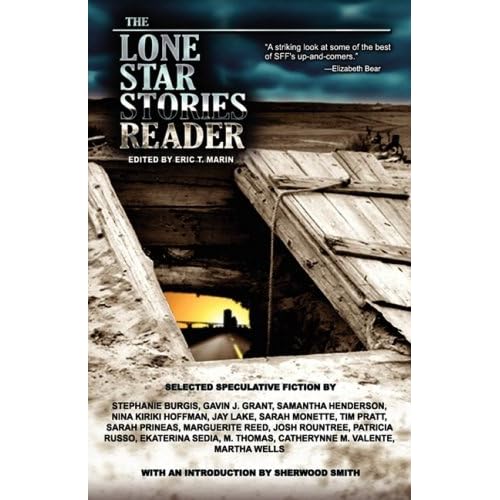 Upon opening the first few pages of this anthology, that first thing that assaults me is the layout. The Lone Star Stories Reader, while functional, looks like an amateurish print-on-demand book: the vertical margins are approaching the borders, the header text is too light, and the spacing between scene breaks seem wrong. There are images above the title of each story appearing almost like a watermark but they honestly don't do anything for the piece. Thankfully, the actual content is worthy of praise and once one immerses themselves in the text, all these layout problems disappear although the occasional lack of indention can be jarring.
Upon opening the first few pages of this anthology, that first thing that assaults me is the layout. The Lone Star Stories Reader, while functional, looks like an amateurish print-on-demand book: the vertical margins are approaching the borders, the header text is too light, and the spacing between scene breaks seem wrong. There are images above the title of each story appearing almost like a watermark but they honestly don't do anything for the piece. Thankfully, the actual content is worthy of praise and once one immerses themselves in the text, all these layout problems disappear although the occasional lack of indention can be jarring.When I first encountered Lone Star Stories, much less this anthology, the first question that popped into my head what the hell was it and what kind of fiction did it published? The opening story, "Wolf Nights" by Martha Wells, immediately told me what kind of book this would be and it's a tone that remains consistent throughout the book. The Lone Star Stories Reader definitely has this fantastical Texan feel to it and in the opening story, this can be seen with the cliche of a wanderer visiting a small town with trouble not lurking too far. Of course what's different here is that there's a fantastical twist--in this case supposedly a werewolf--and it's an adventurous Western romp from there. Was I particularly attached to "Wolf Nights"? No, not really but I did find the writing competent and captured what would be the atmosphere of the rest of the anthology. The same comment goes for "The Great Conviction of Tina Inez" by M. Thomas which features an immigrant story that attempts to appeal to your emotions and includes some elements of magic realism.
Overall, I found the selection of stories to be more or less consistent. There's no horrible story in here but similarly, there's not a lot of stories that outright jump at me. All of them however contain elements that are very different, going beyond the cliche and making good use of the speculative element. This particular anthology focuses more on the fantasy stories (as opposed to science fiction) that Lone Star Stories publishes and unfortunately that's not quite explicitly stated in the cover although it is tackled in the introduction. Speaking of the introduction, editor Eric T. Marin for the most part is "invisible" and allows his selection of stories to speak best for him. What does it convey? Certainly there's a level of competency and minimum level of quality in the featured stories but I'm more impressed with how consistent the theme of Lone Star Stories is and one doesn't need to read the introduction to grasp it. My complaint however is that a lot of the stories aren't striking enough for me although having said that, here are my three favorites, which seem to deviate from the norm:
I've said in previous reviews before that I'm not a big fan of flash fiction but Nina Kiriki Hoffman's "Seasonal Work" is an exception to that rule. There's nothing overtly fanciful with her prose but she carries the narrative through sheer plot and emotional resonance. The author uses conversational dialogue and then slowly builds up to the ending, the impact of which depends on your frame of mind as a reader. Personally, I was leaning more towards the horrific.
Gavin J. Grant's "Janet, Meet Bob" is this metafictional text that keeps you hooked right from the beginning and spawns off into various directions, introducing not only new characters but diverging plot threads. That for the most part is its greatest asset, the way that it reels you in for more although the characterization and the details of the story is nothing to sneeze at either. There are various gems in the story but stating them here would spoil it so I'll let it end there.
Catherynne M. Valente's "Thread: A Triptych" features mesmerizing language and she deftly succeeds in alternating between two different scenes. The modern world is juxtaposed against a backdrop of Greek myth and while this can be confusing to some readers, I personally think it was handled with grace and part of the charm of the story. The metaphors are apt and the conclusion is worthy of the whirlwind this reading experience has been.
The Lone Star Stories Reader is a handy anthology to have. If you're limiting yourself to a few purchases this year, this isn't what I'd call a must-buy but if you're looking for variety, this anthology certainly caters to a particular niche. One thing that can't be denied is that despite the layout problems of the book, it carries with it a definite flavor and style.
No comments:
Post a Comment